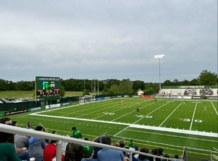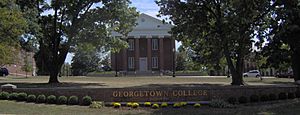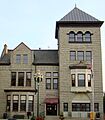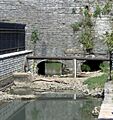Georgetown, Kentucky facts for kids
Quick facts for kids
Georgetown, Kentucky
|
||
|---|---|---|
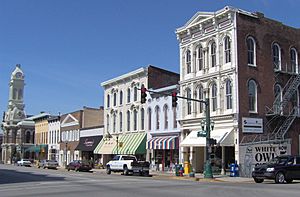 |
||
|
|
||
| Nickname(s):
G-Town
|
||
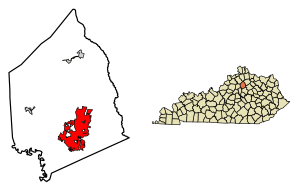
Location of Georgetown in Scott County, Kentucky.
|
||
| Country | United States | |
| State | Kentucky | |
| County | Scott | |
| Established | 1784 | |
| Area | ||
| • City | 17.15 sq mi (44.41 km2) | |
| • Land | 16.98 sq mi (43.99 km2) | |
| • Water | 0.17 sq mi (0.43 km2) | |
| Elevation | 883 ft (269 m) | |
| Population
(2020)
|
||
| • City | 37,086 | |
| • Estimate
(2023)
|
39,462 | |
| • Rank | US: 1054th KY: 6th |
|
| • Density | 2,183.6/sq mi (843.09/km2) | |
| • Metro | 517,846 (US: 109th) | |
| • Demonym | Georgetonian | |
| Time zone | UTC−5 (Eastern) | |
| • Summer (DST) | UTC−4 (EDT) | |
| ZIP Code |
40324
|
|
| Area code(s) | 502 | |
| FIPS code | 021209 | |
| GNIS feature ID | 2403689 | |
Georgetown is a city in Scott County, Kentucky, United States. It is known as a "home rule-class city," which means it has the power to manage its own local government. In 2020, about 37,086 people lived there, making it the 6th largest city in Kentucky. Georgetown is also the main city, or seat, of Scott County.
The city was first called Lebanon when it was founded in 1784 by Rev. Elijah Craig. It was renamed Georgetown in 1790 to honor President George Washington. Early settlers were attracted to the area because of a special water source called Royal Spring.
Georgetown is home to Georgetown College, a private college focused on liberal arts. It is also part of the larger Lexington-Fayette, KY Metropolitan Statistical Area. For a while, the NFL team, the Cincinnati Bengals, used Georgetown as their training camp.
The city started growing a lot in the mid-1980s. This happened when Toyota built its first fully owned United States car factory, Toyota Motor Manufacturing Kentucky, in Georgetown. The factory opened in 1988. It makes popular cars like the Camry, Camry Hybrid, Lexus ES, and RAV4 Hybrid.
Contents
History of Georgetown
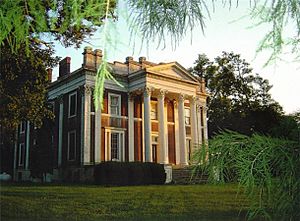
People have lived along Elkhorn Creek in what is now Scott County for at least 15,000 years. When Europeans first arrived, the Shawnee people lived in this area.
European exploration began in 1774 with a survey trip led by Colonel John Floyd. He was given 1,000 acres (4.0 km2) of land in the area for his military service. He named a spring there Royal Spring, but he did not settle. The first English colonist to settle was John McClellan in 1775. He built McClellan's Station, but it was left empty after an attack by Native Americans in 1776.
In 1782, a Baptist preacher named Elijah Craig moved his church group to the area from Virginia. He started a new settlement and called it Lebanon. The Virginia government officially recognized it in 1784. Craig built some of the first mills west of the Appalachian Mountains near Royal Spring. He also made cloth and paper there. In 1789, he started a distillery and a school called Rittenhouse Academy. This school later became Georgetown College.
The city's name was changed to George Town in 1790 to honor President George Washington. When Kentucky became the 15th U.S. state in 1792, George Town became the main city for Scott County. Its name was officially changed to Georgetown in 1846.
The county became known for farming because it was in the rich Bluegrass Region. Farmers grew tobacco and hemp. They also raised special animals like Thoroughbred racehorses, cattle, and sheep. During the Civil War, Kentucky remained part of the Union. Georgetown was attacked twice by Confederate General John Hunt Morgan. These attacks happened on July 15, 1862, and July 10, 1864.
After the war, Georgetown became an important center for railroads. It connected to the Cincinnati Southern, the Louisville Southern, and the Frankfort & Cincinnati. The Frankfort & Cincinnati line was known as the "whiskey route." It carried much of the region's bourbon to markets along the Ohio River.
In 1896, Catholic Sisters of Visitation started a girls' academy. The school closed in 1987. The building was then used as the Cardome Centre, a community center for Georgetown. In 2019, the Catholic Diocese of Lexington bought it.
Georgetown in the 20th Century and Today
Throughout the 1900s, Georgetown changed from a farming economy to one that included factories, small businesses, and family farms. In the 1960s, Interstate 75 was built. This highway made Georgetown a stop on one of the busiest roads in the country.
The biggest growth for Georgetown happened in 1985. That's when Toyota Motor Manufacturing Kentucky chose the city for its new car factory.
The historic Ward Hall is just outside Georgetown. It was the summer home of Junius Ward. This house is a great example of Greek Revival style in Kentucky. It is listed on the National Register of Historic Places (NRHP).
Georgetown's main business area has a historic district called the Oxford Historic District. It is also listed on the NRHP.
Georgetown's Location and Climate
Georgetown is located north of Lexington in Kentucky's Bluegrass region. Important highways that go through the city include Interstate 75 and US Routes 25, 62, and 460.
I-75 is east of downtown. You can get to it from exits 125, 126, 127, and 129. Lexington is about 16 miles (26 km) south on I-75. Cincinnati, Ohio is about 69 miles (111 km) north. US 25 goes through the center of town. It leads south to Lexington and north to Corinth. US 62 goes around the southern and eastern parts of the city. It leads northeast to Cynthiana and southwest to Midway. US 460 goes east-west through the town. It leads east to Paris and west to Frankfort, the state capital.
The United States Census Bureau says the city covers about 15.85 square miles (41.0 km2) of land.
Weather in Georgetown
Georgetown has a humid subtropical climate. This means it has warm summers and winters that are not too cold. Rain is spread out through the year, but late spring and summer usually get more rain. The average rainfall is about 45.28 inches (1,150 mm) per year.
| Climate data for Georgetown, Kentucky | |||||||||||||
|---|---|---|---|---|---|---|---|---|---|---|---|---|---|
| Month | Jan | Feb | Mar | Apr | May | Jun | Jul | Aug | Sep | Oct | Nov | Dec | Year |
| Mean daily maximum °F (°C) | 41 (5) |
46 (8) |
55 (13) |
66 (19) |
74 (23) |
83 (28) |
86 (30) |
86 (30) |
79 (26) |
68 (20) |
55 (13) |
44 (7) |
65 (18) |
| Mean daily minimum °F (°C) | 25 (−4) |
28 (−2) |
36 (2) |
45 (7) |
54 (12) |
63 (17) |
66 (19) |
65 (18) |
58 (14) |
47 (8) |
37 (3) |
28 (−2) |
46 (8) |
| Average precipitation inches (mm) | 3.20 (81) |
3.31 (84) |
4.07 (103) |
3.60 (91) |
5.26 (134) |
4.44 (113) |
4.65 (118) |
3.25 (83) |
2.91 (74) |
3.13 (80) |
3.53 (90) |
3.93 (100) |
45.28 (1,150) |
| Source: The Weather Channel | |||||||||||||
People of Georgetown
| Historical population | |||
|---|---|---|---|
| Census | Pop. | %± | |
| 1800 | 348 | — | |
| 1810 | 529 | 52.0% | |
| 1830 | 1,344 | — | |
| 1840 | 1,511 | 12.4% | |
| 1860 | 1,684 | — | |
| 1870 | 1,570 | −6.8% | |
| 1880 | 2,061 | 31.3% | |
| 1900 | 3,823 | — | |
| 1910 | 4,533 | 18.6% | |
| 1920 | 3,903 | −13.9% | |
| 1930 | 4,229 | 8.4% | |
| 1940 | 4,420 | 4.5% | |
| 1950 | 5,516 | 24.8% | |
| 1960 | 6,986 | 26.6% | |
| 1970 | 8,629 | 23.5% | |
| 1980 | 10,972 | 27.2% | |
| 1990 | 11,414 | 4.0% | |
| 2000 | 18,080 | 58.4% | |
| 2010 | 29,098 | 60.9% | |
| 2020 | 37,086 | 27.5% | |
| 2023 (est.) | 39,462 | 35.6% | |
| U.S. Decennial Census 2020 Census |
|||
In 2010, there were 29,098 people living in Georgetown. There were 10,733 households and 7,452 families. The city had about 1,836 people per square mile (709/km2).
Most people (87.5%) were White. About 7.0% were African American, and 1.2% were Asian. About 4.3% of the population were Hispanic or Latino.
About 38.1% of households had children under 18 living with them. About 49.6% were married couples. The average household had 2.59 people. The average family had 3.09 people.
About 27.9% of the population was under 18 years old. About 8.3% were 65 years or older. The average age was 31.7 years. The average income for a household was $51,692. About 13.9% of the people lived below the poverty line.
Georgetown's Economy
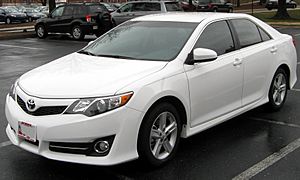
The biggest employers in Georgetown are:
| # | Employer | # of Employees |
|---|---|---|
| 1 | Toyota Motor Manufacturing Kentucky | 10,019 |
| 2 | Scott County Schools | 1,219 |
| 3 | Adient | 743 |
| 4 | Toyota Production Engineering and Manufacturing Center | 740 |
| 5 | Georgetown Community Hospital | 460 |
| 6 | Toyota Tsusho | 413 |
| 7 | Kroger | 395 |
| 8 | Aichi Forge USA | 380 |
| 9 | International Crankshaft | 335 |
| 10 | Walmart | 335 |
Sports in Georgetown
Georgetown is home to Toyota Stadium. This stadium is where Georgetown College's Football Team plays. It also hosts Lexington SC.
Lexington SC is a professional soccer team. They play in USL League One, which is the third-highest level of professional soccer in the United States.
Education in Georgetown
Georgetown College is a private college in downtown Georgetown. It focuses on liberal arts. The Baptist Seminary of Kentucky is also a seminary located in Georgetown.
Public schools in Georgetown and Scott County are part of the Scott County Schools system. They include:
- A preschool center for young students with special needs or from low-income families.
- Nine elementary schools (for grades K–5).
- Three middle schools (for grades 6–8).
- Two high schools (for grades 9–12).
Because the population is growing, the district opened a new high school and a new elementary school in 2019. Elkhorn Crossing School offers special programs for some high school students. These programs combine regular school subjects with career-based learning.
Public schools in Georgetown and Scott County include:
- Creekside Elementary School
- Garth Elementary
- Northern Elementary
- Southern Elementary
- Eastern Elementary
- Western Elementary
- Anne Mason Elementary
- Stamping Ground Elementary
- Lemons Mill Elementary
- Royal Spring Middle School
- Georgetown Middle School
- Scott County Middle School
- Great Crossing High School
- Scott County High School
- Phoenix Horizon Academy
Private schools in Georgetown and Scott County include:
- St. John elementary and middle school
- Providence Christian Academy elementary and middle school
- Keystone Montessori elementary school
Georgetown also has a public library called the Scott County Public Library.
Media in Georgetown
Georgetown's local newspaper is the Georgetown News-Graphic. It is printed on Tuesdays and Fridays. Many local people read this newspaper. They also often read the larger daily newspaper from Lexington, called the Lexington Herald-Leader.
Z-Rock 103.3 FM WXZZ Georgetown is a radio station that plays classic rock and new rock music all day, every day.
Healthcare in Georgetown
Georgetown has one hospital, Georgetown Community Hospital. It is run by LifePoint Health.
UK HealthCare and Baptist Health Lexington also have smaller medical centers in Georgetown. The city has several nursing facilities for older adults or those needing care. These include Signature HealthCARE of Georgetown, Windsor Gardens Retirement Community, Dover Manor Nursing Home, and Ashton Grove Assisted Living.
Notable People from Georgetown
Many interesting people have come from Georgetown, Kentucky. Here are a few:
- William E. Applegate (1851–1928) – A person involved with horse racing, including betting, breeding, and owning tracks.
- Mike Ayers (1948– ) – A former football coach.
- Mary Cyrene Burch Breckinridge (1826–1907) – The wife of Vice President John C. Breckinridge.
- Stephen G. Burbridge (1831–1894) – A major general in the U.S. Army during the Civil War.
- Elijah Craig (1738−1808) – An early Baptist preacher, teacher, and business owner who helped protect religious freedom.
- Basil W. Duke (1838−1916) – A lawyer and Confederate general during the Civil War.
- Tom L. Johnson (1854−1911) – A US Representative and Mayor of Cleveland, Ohio.
- Larry D (1984– ) – A professional wrestler.
- Charles Edward Pogue (1950– ) – A screenwriter, playwright, and actor.
- Ryan Quarles (1983– ) – The current president of the Kentucky Community and Technical College System.
- Dallas Robinson (1982– ) – An Olympian who competed in the 2014 Sochi Russia Games.
- James Fisher Robinson (1800−1882) – The 22nd Governor of Kentucky during the Civil War.
- Jackson Showalter (1859–1935) – A five-time U.S. chess champion.
- Steve Zahn (1967− ) – A well-known actor who lives on a farm in Scott County.
Images for kids
Sister City
Georgetown has one sister city. This means it has a special friendship with a city in another country:
 Tahara, Aichi, Japan
Tahara, Aichi, Japan
See also
 In Spanish: Georgetown (Kentucky) para niños
In Spanish: Georgetown (Kentucky) para niños


